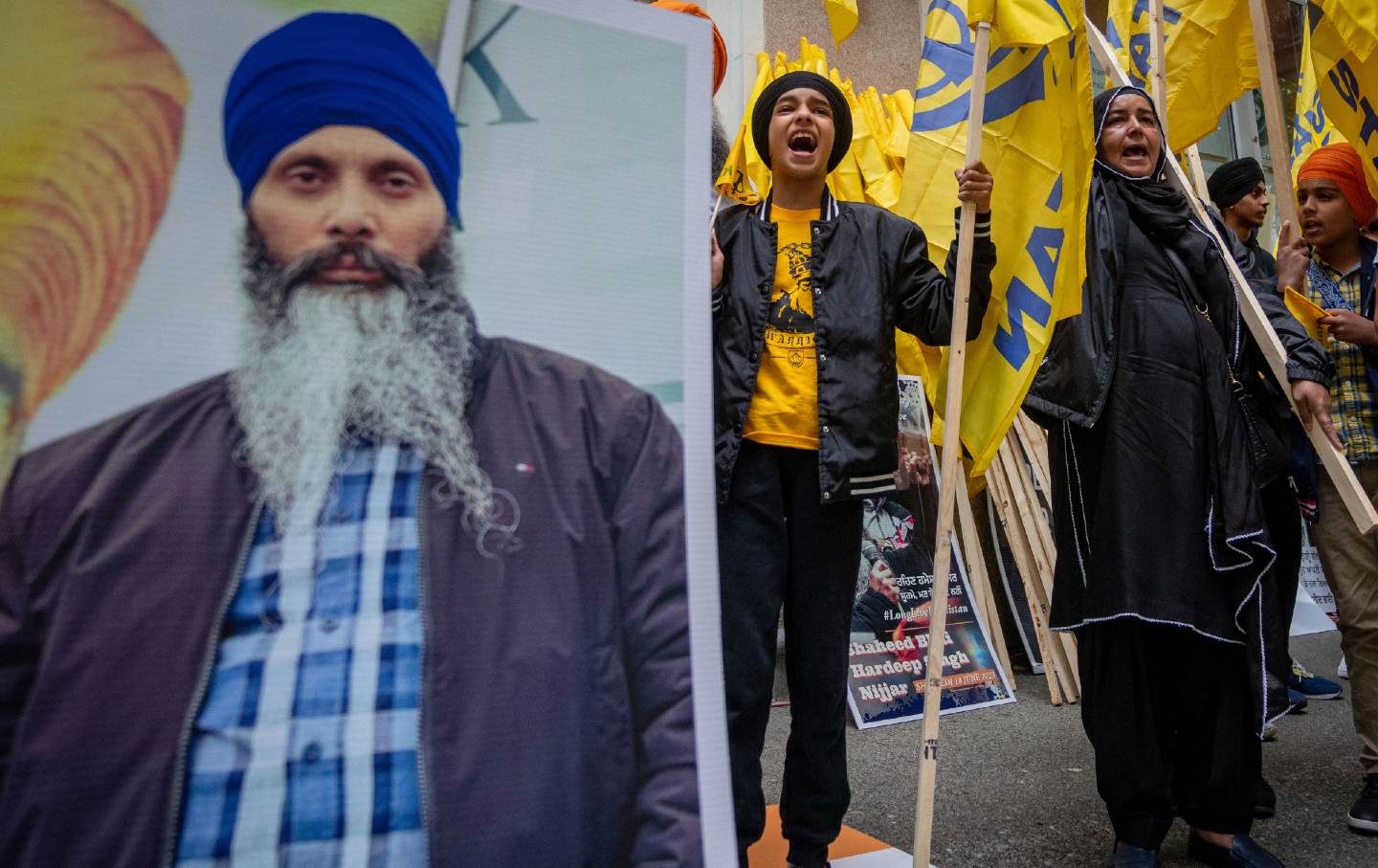
by Arnab Baidya 12 October 2023
On September 18, 2023, the world watched in astonishment as Canadian Prime Minister Justin Trudeau leveled a grave accusation in the Canadian Parliament. He alleged that the Indian government was behind the assassination of a Canadian citizen, Hardeep Singh Nijjar, on Canadian soil. This accusation has ignited a global debate and cast a spotlight on the state of dissent and human rights in India. Nijjar’s tragic case is not an isolated incident but rather emblematic of a broader pattern in India where dissent is increasingly met with repression. In this article, we will explore the Nijjar case, the historical context of the Khalistan movement, and the troubling trend of stifling dissent in India.
Hardeep Singh Nijjar was a prominent activist who met a tragic end outside a Sikh temple in Canada, where he served as its president. Trudeau’s accusation that the Indian government had a hand in his killing sent shockwaves globally. Nijjar had been an advocate for Sikh secession, a cause that had led the Indian government to label him a terrorist. Accusing a foreign government of assassinating a Canadian citizen on Canadian soil is a serious allegation that demands thorough investigation and scrutiny. The Indian government has vehemently denied any involvement in Nijjar’s killing. Nevertheless, the allegations raise deeply troubling questions about the lengths to which India might go to suppress dissent, even beyond its borders. This case necessitates a close examination of the Indian government’s treatment of dissent and its implications for democracy and human rights in the world’s most populous democracy.
Understanding the gravity of Nijjar’s assassination requires a look into the historical context of Sikh separatism in India. From the 1970s through the ’80s and ’90s, Sikh insurgents in northern India waged a violent campaign to establish Khalistan, an independent Sikh nation. Many Sikhs in Canada supported this movement by raising funds and advocating for its cause in Canadian temples. Some even facilitated the travel of separatist cadres to Pakistan, where they received financial and military assistance. The year 1985 marked a tragic turning point when Talwinder Singh Parmar, a Sikh Canadian, orchestrated the bombing of Air India Flight 182, killing all 329 passengers and crew members. This act became one of the deadliest plane attacks until September 11, 2001. Parmar was a terrorist, and the Khalistani movement, despite its bloodshed, was largely unpopular among Indian Sikhs.
However, India’s response to the Sikh insurgency was characterized by relentless violence, resulting in thousands of civilian casualties. At one point, separatists took refuge in the Golden Temple, Sikhism’s holiest site, leading to a military operation that claimed numerous lives and inflicted damage upon the sacred site. The assassination of Prime Minister Indira Gandhi by two Sikhs triggered an anti-Sikh pogrom in India. Hardeep Singh Nijjar’s case stands out amidst this tumultuous history. While the Indian government accused him of planning attacks on its soil, he consistently denied these allegations and was never extradited. The Sikh insurgency largely ended over two decades ago. If India were indeed involved in Nijjar’s assassination, it suggests a departure from the past. It implies that India’s actions are no longer solely driven by concerns about Sikh secession but reflect a broader shift towards illiberalism and religious intolerance.
The escalation of violence against India’s religious and ethnic minorities and the government’s growing illiberal policies have become increasingly evident since the rise of Prime Minister Narendra Modi in 2014. Under his leadership, India has implemented measures that disproportionately affect non-Hindus. The revocation of Jammu and Kashmir’s autonomy and its division into two union territories, along with a contentious citizenship law, have raised concerns about the treatment of minorities. Additionally, violence against tribal minorities in India’s northeast has continued with little intervention.
Sikhs have been relatively spared from the most extreme ethnonationalist measures. However, the recent incident involving Nijjar suggests that they are no longer immune to government scrutiny. The Modi government may be concerned that Sikhs, who played a significant role in opposing his agricultural reform bills in 2021, could pose obstacles to his Hindu-nationalist agenda or reignite a separatist insurgency. This raises questions about the Indian government’s approach to Sikh activism and its readiness to suppress it.
The killing of Hardeep Singh Nijjar has not only infuriated Canada but has also drawn international attention to India’s actions. India, however, has responded dismissively, including the prohibition of Sikh Canadian politician Jagmeet Singh from entering the country and accusations of colonialism against critics of the Modi government. India’s primary Hindu-nationalist organization’s calls for the creation of “Akhand Bharat,” a greater India encompassing neighboring regions, have further fueled concerns on the global stage. The United States, a key global player, has responded cautiously. Washington sees India as a crucial partner in its competition with China and is wary of alienating New Delhi. However, it is essential to acknowledge that India’s interests in countering China do not necessarily align with support for Western democratic values.
The assassination of Hardeep Singh Nijjar, the allegations against the Indian government, and the broader context of rising illiberalism and religious intolerance in India paint a deeply troubling picture. India’s actions suggest a departure from its democratic principles and a willingness to suppress dissent, even beyond its borders. While the international community may prioritize its strategic interests, it must not ignore the erosion of democratic values in India. It is incumbent upon nations that cherish democracy and human rights to engage constructively with India and raise concerns about its treatment of dissenting voices and minorities. Only by addressing these issues can India be encouraged to uphold the principles of democracy and pluralism that it claims to represent. As the global community navigates these challenges, it must remember the importance of safeguarding fundamental human rights and democratic values, even in the face of geopolitical complexities.
